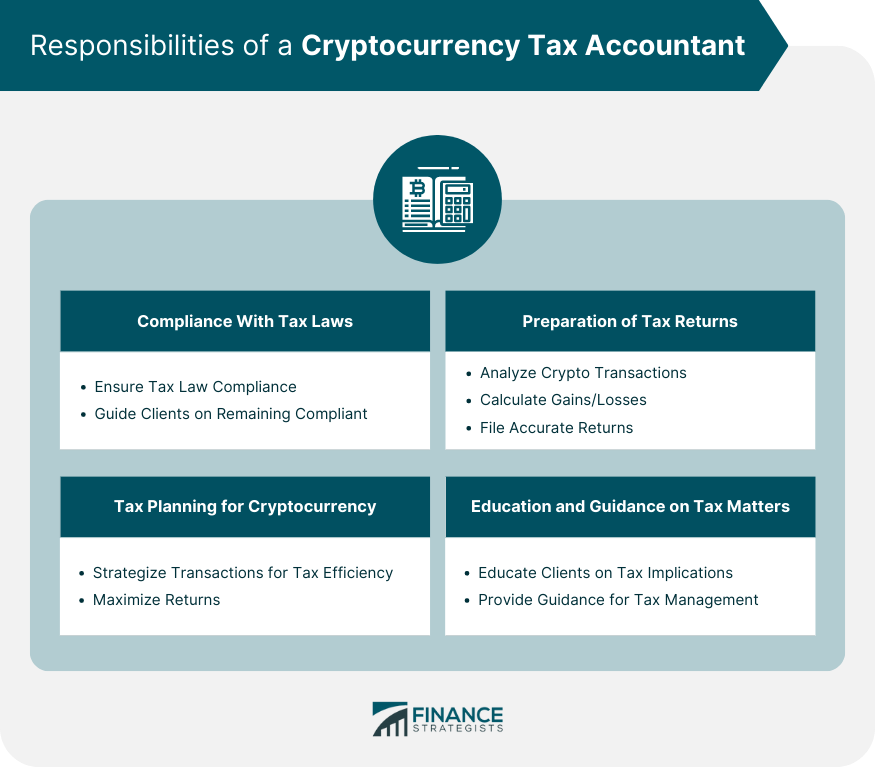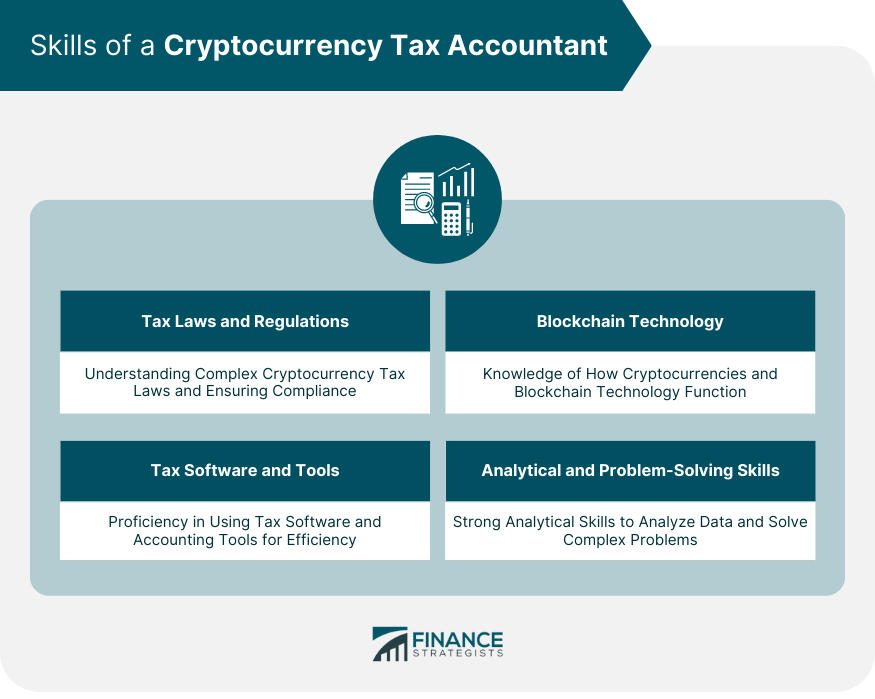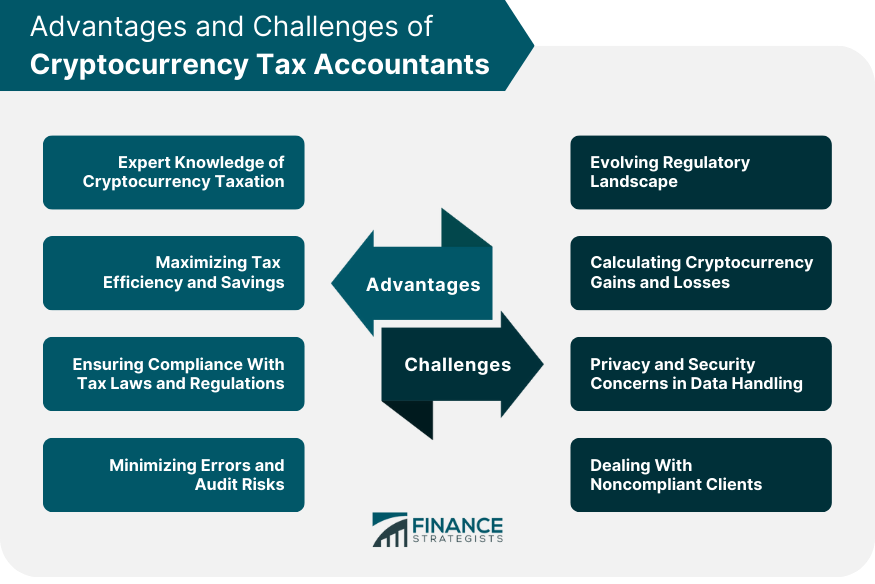A cryptocurrency tax accountant is a financial professional who specializes in handling tax issues related to cryptocurrencies. They are adept in deciphering the complexities of digital currency transactions, assisting clients with regulatory compliance, tax preparation, and planning in the realm of cryptocurrencies. This role necessitates a keen understanding of blockchain technology, as well as evolving tax laws and regulations surrounding digital currencies. As cryptocurrency transactions become increasingly mainstream, they come under the purview of tax authorities worldwide. These transactions can have significant tax implications, and failure to properly account for them can result in hefty penalties. Investors, traders, and businesses dealing in cryptocurrencies need to understand their tax obligations to avoid any legal issues. That's where cryptocurrency tax accountants come into the picture, offering their expertise to help individuals and businesses navigate the complex world of cryptocurrency taxation. Cryptocurrency tax accountants shoulder numerous responsibilities. Their role is not only crucial in helping clients understand and meet their tax obligations but also in optimizing their cryptocurrency investments for tax efficiency. One of the key responsibilities of a cryptocurrency tax accountant is to ensure compliance with all relevant tax laws and regulations. They stay abreast of evolving rules related to cryptocurrency transactions, interpret them in the context of a client's situation, and guide the client on how to remain compliant. They also handle any communication with tax authorities and resolve any compliance issues that arise. Cryptocurrency tax accountants also take charge of preparing and filing tax returns related to cryptocurrency transactions. They carefully analyze a client's crypto transactions throughout the year, accurately calculate capital gains or losses, and prepare a detailed tax return. They ensure that all necessary documentation is in place and that the return is filed on time, helping clients avoid penalties and interest charges. Tax planning is another critical responsibility of a cryptocurrency tax accountant. They help investors strategize their cryptocurrency transactions to optimize tax efficiency. This may involve timing of transactions, selection of specific cryptocurrencies, or structuring of investments in a particular way. With a comprehensive tax strategy, clients can minimize their tax liabilities and maximize their after-tax returns. Cryptocurrency tax accountants also serve as educators. They help clients understand the tax implications of their cryptocurrency transactions, explaining complex tax rules in simple terms. They guide clients on how to track and document transactions, how to manage tax liabilities, and what to expect in case of a tax audit. This guidance is crucial in helping clients make informed decisions and avoid costly mistakes. To effectively perform their role, cryptocurrency tax accountants need a unique blend of skills. A thorough understanding of cryptocurrency tax laws and regulations is a fundamental skill for a cryptocurrency tax accountant. These laws can be complex and vary from one jurisdiction to another. Accountants need to keep up with changes in these laws, understand how they apply to different types of transactions, and ensure their clients' compliance. Cryptocurrency tax accountants need to know how cryptocurrencies work, how transactions are recorded on the blockchain, and how to retrieve and interpret this data. This knowledge is key to accurately tracking and reporting cryptocurrency transactions. Proficiency in tax software and cryptocurrency accounting tools is a critical skill for a cryptocurrency tax accountant. These tools can automate much of the data collection and calculation process, making the accountant's job more efficient. Accountants need to know how to use these tools effectively, how to integrate them with other systems, and how to troubleshoot any issues that arise. Cryptocurrency tax accountants also need strong analytical and problem-solving skills. They need to be able to analyze complex transaction data, identify trends and patterns, and make sense of ambiguous situations. They also need to be able to solve problems - whether it's figuring out a discrepancy in transaction data, resolving a compliance issue, or finding a way to minimize a client's tax liability. The foremost advantage of a cryptocurrency tax accountant lies in their expert knowledge of cryptocurrency taxation. They understand the intricate tax laws and regulations surrounding cryptocurrency transactions and can navigate through the complex world of digital currency with ease. They can provide valuable insights and advice, helping clients make informed decisions and stay on the right side of the law. They can identify opportunities for tax deductions and credits, strategize transactions to reduce tax liabilities, and ensure that clients take advantage of all available tax benefits. This can result in substantial tax savings, improving the overall return on cryptocurrency investments. Cryptocurrency tax accountants play a crucial role in ensuring compliance with tax laws and regulations. They stay updated with the latest changes in tax laws, interpret them in the context of a client's situation, and ensure all tax obligations are met. They handle all the paperwork, calculations, and filing, taking the burden off the client's shoulders and providing peace of mind. Finally, hiring a cryptocurrency tax accountant can minimize errors and audit risks. Cryptocurrency transactions can be complex and difficult to track, and mistakes can lead to incorrect tax filings, penalties, and audit risks. An experienced accountant can prevent these errors, ensuring accurate and timely reporting of all cryptocurrency transactions. The rapidly evolving regulatory landscape is a significant challenge for cryptocurrency tax accountants. Tax laws and regulations related to cryptocurrencies are often in flux as governments around the world grapple with how to regulate this new asset class. Keeping up with these changes and understanding their implications can be a daunting task. Another challenge is the complexity involved in calculating gains and losses from cryptocurrency transactions. Factors such as the high volatility of cryptocurrencies, the use of different currencies and exchanges, and the application of different tax rules in different jurisdictions can make the calculation process incredibly complex. Privacy and security are also significant concerns for cryptocurrency tax accountants. They need to handle sensitive client data, including transaction details, securely. They also need to ensure that the client's privacy is maintained, especially when dealing with pseudonymous cryptocurrencies such as Bitcoin. Lastly, cryptocurrency tax accountants may face challenges in dealing with noncompliant clients. Some clients may not understand or may choose to ignore their tax obligations related to cryptocurrencies. Helping such clients understand the importance of compliance, and guiding them towards it, can be a challenging aspect of an accountant's role. Cryptocurrency tax accountants are financial professionals specializing in handling tax matters related to cryptocurrencies. They possess in-depth knowledge of cryptocurrency tax laws and regulations, enabling them to assist clients in complying with tax obligations, optimizing tax efficiency, and minimizing errors. These professionals provide services such as preparing and filing accurate tax returns, offering tax planning strategies, and educating clients on tax implications. Cryptocurrency tax accountants possess skills in blockchain technology, tax software, and analytical thinking. They offer expert advice, ensuring clients maximize tax benefits, remain compliant, and mitigate audit risks. The challenges posed by the evolving regulatory landscape, complexities in calculating gains and losses, privacy concerns, and noncompliant clients affect cryptocurrency tax accountants.What Is a Cryptocurrency Tax Accountant?
Responsibilities of a Cryptocurrency Tax Accountant
Compliance With Tax Laws and Regulations
Preparation of Cryptocurrency Tax Returns
Tax Planning and Strategy for Cryptocurrency Investors
Education and Guidance on Tax Implications

Skills of a Cryptocurrency Tax Accountant
Cryptocurrency Tax Laws and Regulations
Blockchain Technology and Cryptocurrency Understanding
Tax Software and Cryptocurrency Accounting Proficiency
Analytical and Problem-Solving Skills

Advantages of Cryptocurrency Tax Accountants
Expert Knowledge of Cryptocurrency Taxation
Maximizing Tax Efficiency and Savings
Ensuring Compliance With Tax Laws and Regulations
Minimizing Errors and Audit Risks
Challenges for Cryptocurrency Tax Accountants
Evolving Regulatory Landscape
Complexities in Calculating Cryptocurrency Gains and Losses
Privacy and Security Concerns in Handling Data
Dealing With Noncompliant Clients

Conclusion
Cryptocurrency Tax Accountant FAQs
A cryptocurrency tax accountant helps individuals and businesses navigate the tax implications of their cryptocurrency transactions. They ensure compliance with tax laws, prepare and file tax returns, provide tax planning strategies, and educate clients on the tax aspects of cryptocurrency transactions.
Cryptocurrency taxation is important because it is a legal obligation for anyone engaging in cryptocurrency transactions. The tax implications of these transactions can be significant, and failure to properly account for them can result in penalties and interest charges. Cryptocurrency taxation also plays a role in the overall return on cryptocurrency investments.
A cryptocurrency tax accountant needs a deep understanding of tax laws and regulations related to cryptocurrencies, proficiency in blockchain technology and cryptocurrencies, skill in using tax and cryptocurrency accounting software, and strong analytical and problem-solving abilities.
Hiring a cryptocurrency tax accountant can ensure compliance with tax laws, maximize tax efficiency and savings, minimize errors and audit risks, and provide peace of mind. These professionals have the expert knowledge and skills to handle the complexities of cryptocurrency taxation, which can be a challenging task to manage on your own.
Cryptocurrency tax accountants face several challenges, including an evolving regulatory landscape, complexities in calculating cryptocurrency gains and losses, privacy and security concerns in handling cryptocurrency data, and dealing with noncompliant clients. Despite these challenges, they play a crucial role in helping clients manage their tax obligations related to cryptocurrency transactions.
True Tamplin is a published author, public speaker, CEO of UpDigital, and founder of Finance Strategists.
True is a Certified Educator in Personal Finance (CEPF®), author of The Handy Financial Ratios Guide, a member of the Society for Advancing Business Editing and Writing, contributes to his financial education site, Finance Strategists, and has spoken to various financial communities such as the CFA Institute, as well as university students like his Alma mater, Biola University, where he received a bachelor of science in business and data analytics.
To learn more about True, visit his personal website or view his author profiles on Amazon, Nasdaq and Forbes.











